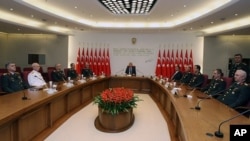For the first time in Turkey, a serving general is appearing before a civilian court. The general and other senior officers are accused of seeking to overthrow the government in an alleged conspiracy called "Sledgehammer." Prosecutors claim the investigation seeks to end political meddling by the army, but concern is growing that there maybe other motives behind the four-year investigation.
General Bilgin Balanli has appeared before a civilian court, along with 27 others on charges of seeking to undermine the government. General Balanli was set to become commander of the air force until his detention three months ago.
Prosecutors claim he is part of a army conspiracy called "Sledgehammer." If convicted, the officers face up to 20 years in jail. Hundreds of military officers have been detained as part of the probe.
The Turkish daily Taraf has been in the forefront of exposing the allegations. Deputy Editor Yasmin Congar says the investigation is key to cleansing Turkish politics of meddling by its generals.
"It is very, very important, because it is basically about digging out the dirt within the state and digging out all these secret institutions, secret organizations, which are allegedly behind many, many crimes in this country," said Congar.
The Sledgehammer case is the second trial in connection with the alleged conspiracy. In December, 200 officers went on trial on similar charges.
Prosecutors claim there was an elaborate plan to cause chaos in the country, including provoking a conflict with neighboring Greece and bombing mosques in Turkey. The army has a long tradition of meddling in politics, forcing from office four governments since 1960.
But political analyst and retired brigadier general Haldun Solmazturk says the probes are a political witch hunt instigated by the government.
"It is aiming for one-party rule," said Solmazturk. "They do not like democracy. Once they eliminate the army, there is no other power that can challenge one-party rule, one-party regime. That is why the government has been so adamant in supporting this unjust justice system."
Defense lawyers say earlier this year police were forced to admit they had planted incriminating names and telephone numbers on the phone of one of the accused officers.
Concern has been increasing, both domestically and internationally, about the investigations, which have been ongoing for four years, with no convictions. The largest and longest trial, the alleged Ergenekon conspiracy, is now in its third year.
Along with army officers, many of those on trial include journalists and well-known critics of the government. But the head of ruling AK party's parliamentary foreign affairs committee Volkan Bozkir dismisses charges the investigations are politically motivated.
"The courts are independent in Turkey," said Bozkir. "It is the system which decides, and according to the constitution, the courts and the execution power and the parliamentary power are separate."
Turkish prosecutors are showing no signs of easing up pressure on the armed forces, with arrests continuing. Earlier this month, more than 20 army officers were detained in connection with another conspiracy against the government allegedly involving using the Internet to disseminate anti-government propaganda.
Nearly all those arrested in connection with the investigations are in jail, some for more than three years. About 10 percent of Turkey's senior generals are behind bars. Retired general Solmazturk warns about the impact on the army's capability.
"They already have had a detrimental effect on morale and operational readiness, there is no doubt about that, claiming anything else would be illogical," he said. "So many generals and admirals, including acting general and admirals are in jail."
Meanwhile, Turkey is facing growing instability on its border with Syria and a resurgence in fighting against the Kurdish rebel group, the PKK.
Earlier this month, all of Turkey's most senior generals resigned to protest the investigations. But the resignations are widely seen as only further strengthening the government's control on the military. Putting the army under civilian control is a key demand of the European Union, which Turkey is seeking to join. But with no end in sight for the arrests and trials, concerns about their legitimacy are expected to grow.
Alleged Military Coup Plotters on Trial in Turkey
- By Dorian Jones




